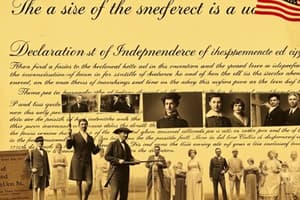Podcast
Questions and Answers
What was the main reason for the growing estrangement between the British crown and the American colonies?
What was the main reason for the growing estrangement between the British crown and the American colonies?
- The colonists' desire to join the British East India Company
- The British crown's decision to abolish slavery in the colonies
- The British crown's refusal to grant the colonies independence
- The British efforts to assert greater control over colonial affairs, including taxation without representation (correct)
What was the outcome of the Treaty of Paris in 1783?
What was the outcome of the Treaty of Paris in 1783?
- The British East India Company was granted a monopoly over colonial trade
- The British crown gained control over the 13 American colonies
- The American colonies remained under British rule
- The independence of the 13 American colonies was recognized (correct)
What was significant about the Battle of Bunker Hill in 1775?
What was significant about the Battle of Bunker Hill in 1775?
- The British East India Company was defeated, leading to its dissolution
- The Americans held their own against the British, showing they were not intimidated (correct)
- The British defeated the Americans, ending the war
- The Americans won a decisive victory, forcing the British to surrender
What was the consequence of the war for the loyalists who chose to remain British subjects?
What was the consequence of the war for the loyalists who chose to remain British subjects?
What was the impact of the war on the development of Canada's national identity?
What was the impact of the war on the development of Canada's national identity?
What was the outcome of the Battle of Moores Creek Bridge in 1776?
What was the outcome of the Battle of Moores Creek Bridge in 1776?
What was the main consequence of the First War of Independence?
What was the main consequence of the First War of Independence?
What was the role of the British East India Company in the First War of Independence?
What was the role of the British East India Company in the First War of Independence?
What was the significance of the Treaty of Paris in 1783?
What was the significance of the Treaty of Paris in 1783?
What was the outcome of the Battle of Charleston in 1776?
What was the outcome of the Battle of Charleston in 1776?
Flashcards are hidden until you start studying
Study Notes
The First War of Independence: Causes and Consequences
The First War of Independence, also known as the American Revolution, was a pivotal event in history. It began in 1775 and lasted until September 3, 1783. The war was a result of a growing estrangement between the British crown and the American colonies, which led to the colonies declaring their independence. The causes and consequences of this war are illustrated through the following key points:
- Causes: The American colonies were unhappy with British efforts to assert greater control over colonial affairs. These efforts included taxation without representation, which led to a sense of injustice among the colonists.
- Consequences: The war ended with the Treaty of Paris, which recognized the independence of the 13 American colonies and established the United States of America. The war also had a profound effect on the development of Canada's national identity. The loyalists, who chose to remain British subjects, were largely unwelcome in the new United States and had to find new homes in Britain, Canada, and British colonies in the West Indies.
Key Battles and Events
The American Revolution was marked by several key battles and events that shaped its outcome:
- Battle of Bunker Hill: In June 1775, the Americans held their own against the British at Bunker Hill, showing that they were not intimidated by the British soldiers.
- Battle of Moores Creek: In February 1776, a patriot army defeated a loyalist force at the Battle of Moores Creek Bridge, largely quieting loyalist activity in the Carolinas for three years.
- Battle of Charleston: In June 1776, the British attempted to take Charleston, but were unable to land their troops due to the tricky waters of the harbor and were forced to retreat.
- Declaration of Independence: In July 1776, the Second Continental Congress adopted the Declaration of Independence, officially declaring the American colonies' independence from Britain.
- Battle of Yorktown: In October 1781, the French, supporting the American forces, defeated the British army led by Lord Cornwallis, effectively ending the war.
British East India Company
The British East India Company played a significant role during the First War of Independence:
- Recruitment of Mercenaries: The British government purchased about 30,000 troops from various German princes, including the landgrave of Hesse, which caused antagonism among the American colonists.
- Treaty of Paris: The Treaty of Paris, signed on September 3, 1783, officially ended the war, and Canada remained a British province, beginning its separate development as a U.S. neighbor.
In conclusion, the First War of Independence was a significant event in the history of the United States. It was caused by growing tensions between the British crown and the American colonies, and it resulted in the independence of the 13 colonies. Key battles and events, such as the battles of Bunker Hill and Moores Creek, as well as the adoption of the Declaration of Independence, played a crucial role in the outcome of the war. The British East India Company also had a significant impact on the war, particularly through the recruitment of mercenaries and the signing of the Treaty of Paris.
Studying That Suits You
Use AI to generate personalized quizzes and flashcards to suit your learning preferences.




